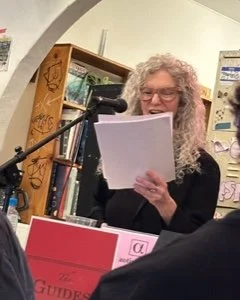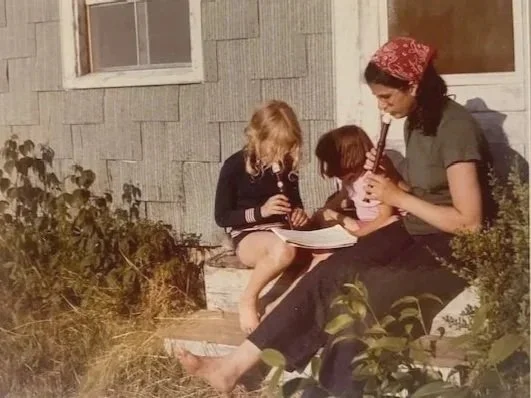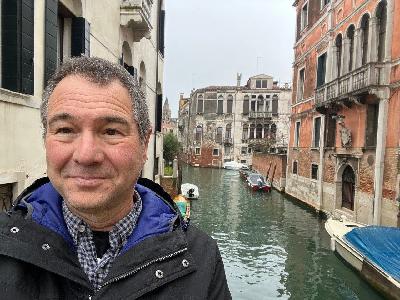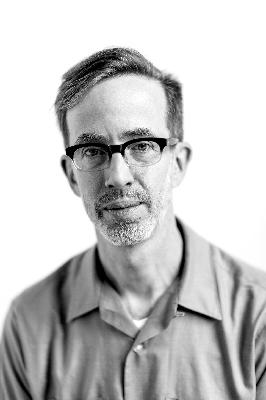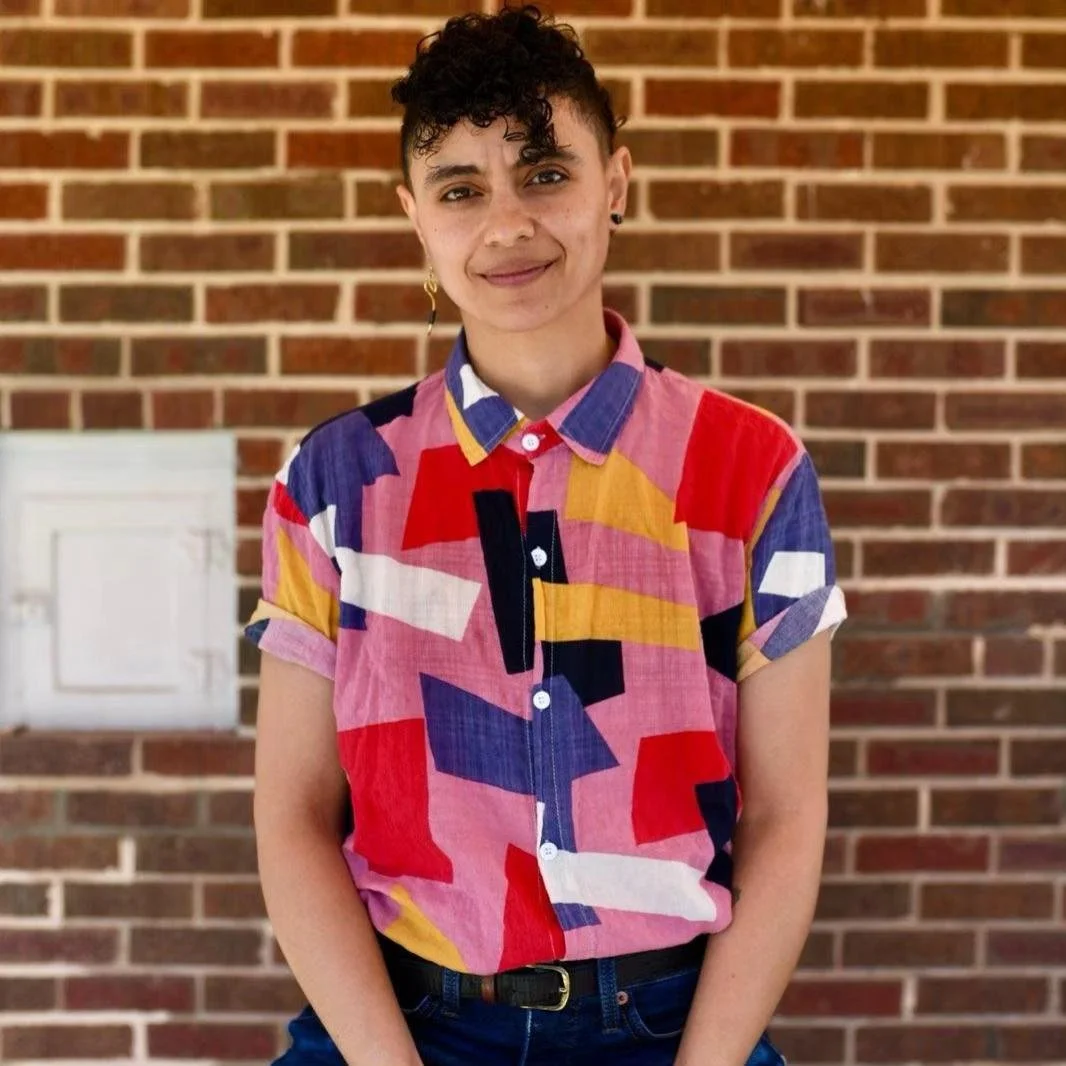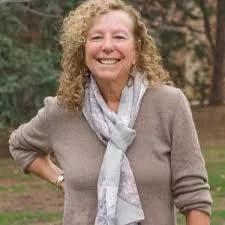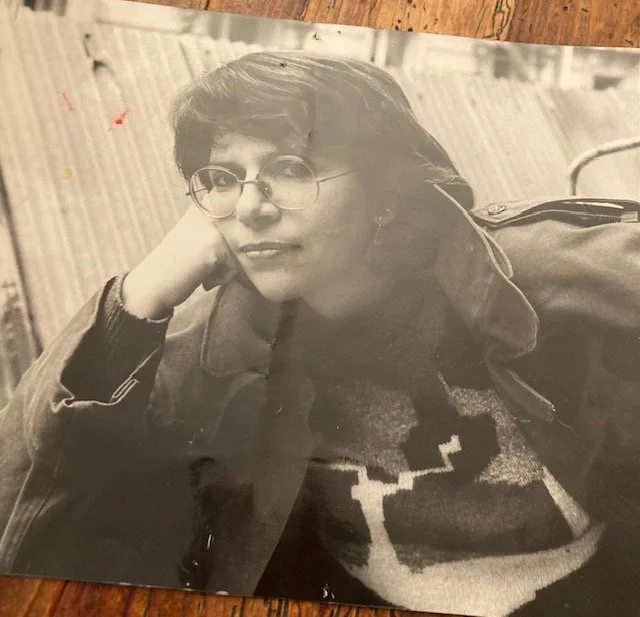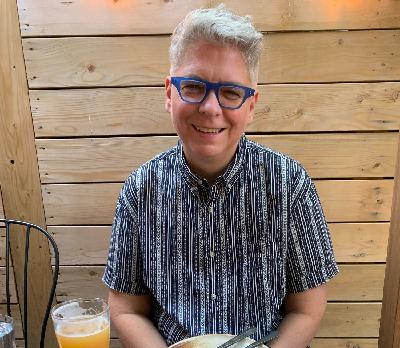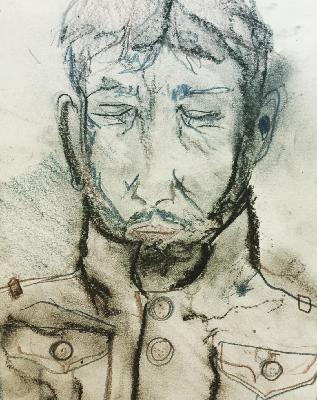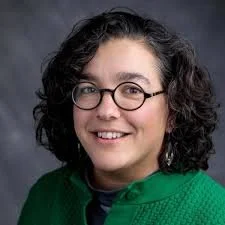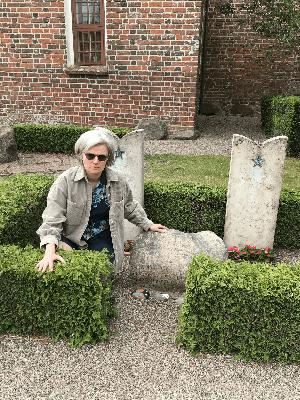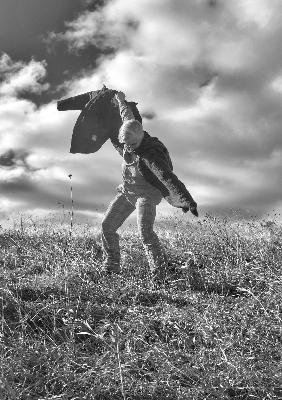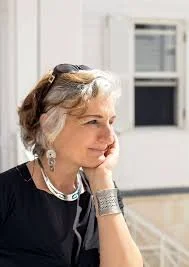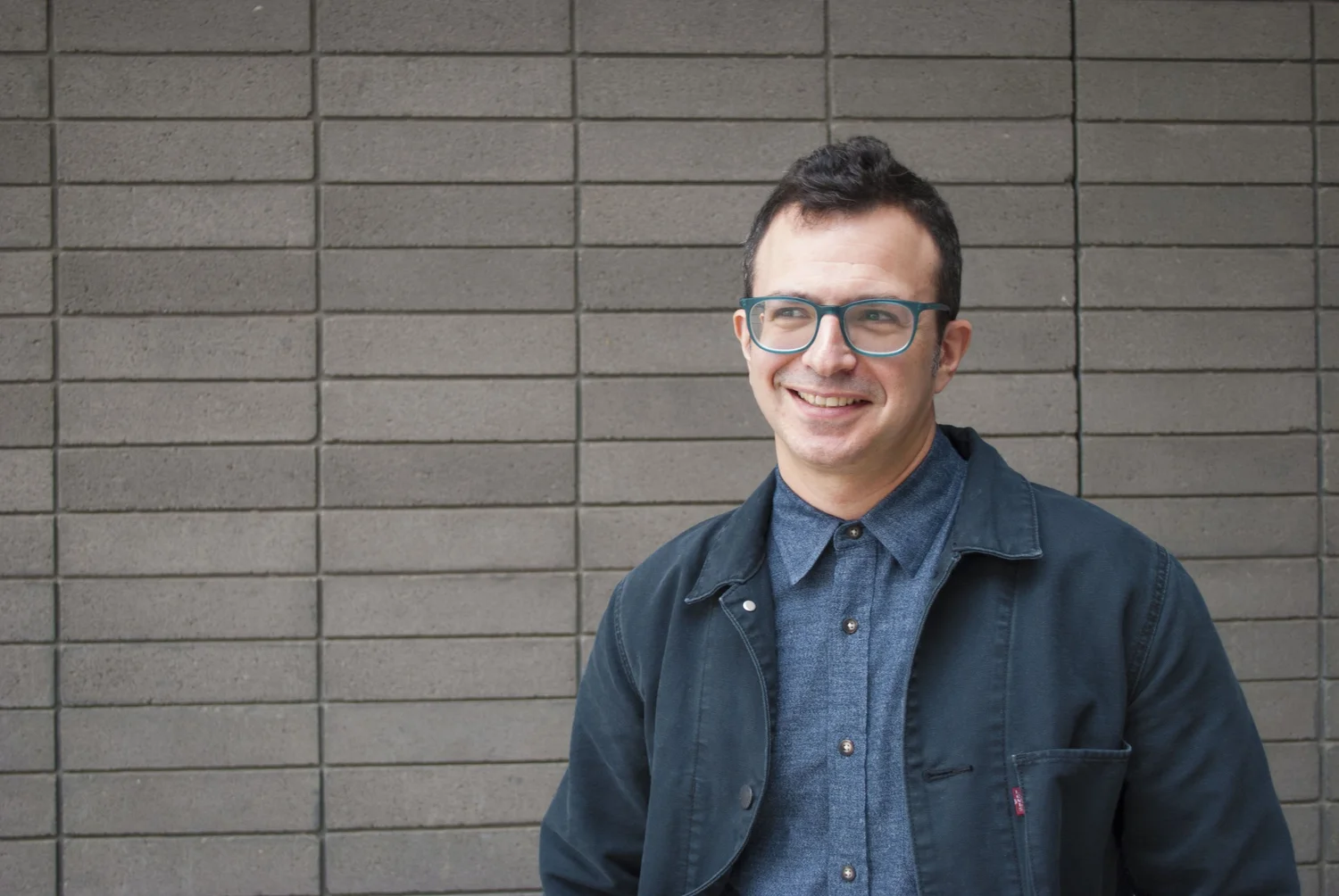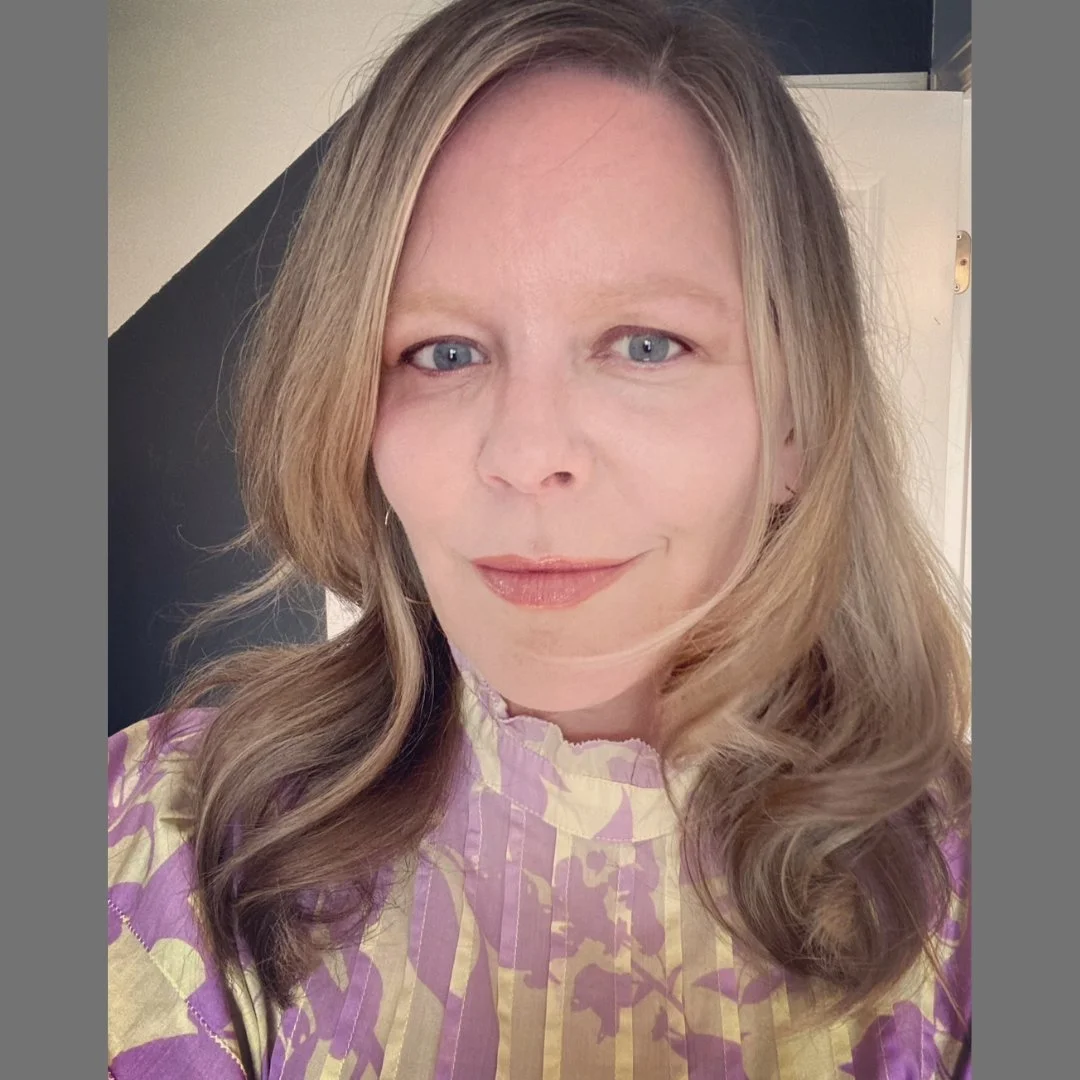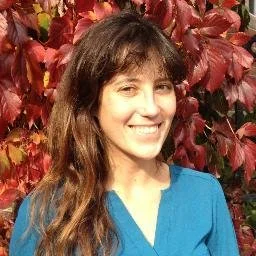Discover Return the Key: Jewish Questions for Everyone
Return the Key: Jewish Questions for Everyone

Return the Key: Jewish Questions for Everyone
Author: Julie Carr
Subscribed: 0Played: 5Subscribe
Share
© Return the Key: Jewish Questions for Everyone copyright Julie Carr. The original music is composed and performed by Ben Roberts.
Description
“We are all…the unchosen, but we are nevertheless unchosen together.” - Judith Butler
This is podcast in which Julie Carr and occasional cohosts interview artists, writers, activists, scholars, religious leaders and others, asking questions related to Jewish (and non-Jewish) themes, such as oneness and the one, time and the infinite, home and diaspora, return and renewal, knowing and unknowing, law and practice, text and textuality, the idea of justice and the idea of love.
27 Episodes
Reverse
In episode 27, I talk with poet Susan Gevirtz about her childhood growing up in Los Angeles, within the two “religions” of Hollywood and Freudian psychoanalysis. We talk about her early experiences in the world of Hollywood films through her grandfather’s work as the musical director for Universal, and her sense, even as a young person, that the world that was presented to her was a made place, invented and therefore radically open to inquiry. We dig into her ongoing project, Guide School, a multi-faceted blended-genre manuscript that interrogates the longing for a “homeland,” and the unsatisfiable and therefore motivating desire for “origins” of all kinds - epistemological, historical, textual, and spiritual. Susan talks about her travels in Eastern Europe, the phenomenon of “the guide schools” in which tour guides are trained to present particular versions of history, and her encounters with the YIVO archive for Jewish Research of both Vilnius Lithuania and New York City. We end by discussing our somewhat vexed curiosity about Kabbalah, and mystical traditions in general, thinking together about how reading/writing as a practice of unknowing and infinite encounter might itself be a mystical tradition. Books and institutions mentionedMoses Maimonides: The Guide to the Perplexed: a New Translation, Translated and with Commentary by Lenn E. Goodman and Phillip I. LiebermanMarc-Alain Ouaknin, The Burnt Book: Reading the TalmudJeffrey Veidlinger, In the Midst of Civilzed Europe: The 1918-1921 Pogroms in Ukraine and the Onset of the HolocaustYIVO Institute for Jewish ResearchMusic by Ben Roberts: Benjamin.Roberts447@gmail.comComments and ideas to Juliealicecarr@gmail.com
In episode 26, I talk with Anas Qutob and Dave Snyder of Minneapolis about their friendship and their work as leaders in the Minnesota chapter of Friends of Standing Together—a grassroots progressive organization of Israeli Jews and Palestinians dedicated to peace, justice, and social transformation. Anas speaks of his childhood growing up during the Israeli invasion of his home city, Nablus, in the West Bank, and about working his way through law school before becoming a labor organizer in Minneapolis. Dave, the grandson of Holocaust survivors, and a longtime social justice organizer, speaks of his journey toward deep commitment to the Palestine justice movement. We talk what Standing Together means to us and about the sacred work of friendship grounded in listening, in mutual recognition of suffering, and in working relentlessly for change. We end by reading a section of one of Mahmoud Darwish’s final poems, “Mural,” in both Arabic and English. “One day I will be what I want” is a line from “Mural” in John Berger and Rema Hammami’s translation. Standing Together’s Theory of ChangeMahmoud Darwish, Mural, trans. John Berger and Rema Hammami Music by Ben Roberts: Benjamin.Roberts447@gmail.comComments and ideas to Juliealicecarr@gmail.comAnas J. Qutob was born and raised in Nablus (Shechem), Palestine. The son of a repatriated refugee born in exile in 1969, his family returned from Jordan to the Old City of Nablus in 1974, where they lived until 2007. His father, a tailor, supported the family through years of political and social upheaval. Anas earned his law degree in 2017 and joined the Palestinian Bar Association in 2020, practicing civil and criminal law in the West Bank until moving to the United States in 2023. He now works as an Organizer with SEIU Healthcare Minnesota & Iowa’s Member Action Center and is a Co-founder of Minnesota Friends of Standing Together (FoST–Israel/Palestine). He currently lives in Minneapolis with his turtle shell cat. Dave Snyder grew up in Minneapolis, the grandson of Holocaust survivors who fled Austria in 1939. He has spent the last 30 years as a campus living wage activist, labor organizer with the Hotel Employees and Restaurant Employees Union local 7, housing justice organizer and then deputy director of Jewish Community Action (JCA), convenor of the Minnesota Asset Building Coalition (MABC), then statewide program director for “Family Assets for Independence in Minnesota” (FAIM). Dave has served on the Board of Directors of the National Community Reinvestment Coalition (NCRC), and currently serves on the Board of Directors of Unidos MN, and as co-founder of the MN chapter of Friends Of Standing Together (FOST) - Israel/Palestine. Dave lives in Richfield with his wife Kristy, plus two massive teens, two obnoxious puppies, and two persnickity cats.
In episode 25, I speak with Benjamin Balthaser about his new book, Citizens of the Whole World: Anti-Zionism and the Cultures of the American Jewish Left, just published by Verso. Benjamin tells me about his beloved communist grandparents and his own background as a labor activist and longtime member of Jewish Voice for Peace. We discuss the historical precedents to the current eruption of anti-Zionism among U.S. Jews on the left as we dig into the history, especially from the 1970s, of Jewish diasporism as a political identity. Benjamin shows us how diasporism grew out of the practical politics of the 1970s in response to the collapse of the New Left, the Jewish institutional turn towards Zionism, and the emergence of “identity politics.” We end by talking about the challenges of intersectional solidarity then and now, asking what we can learn from these earlier generations about maintaining our commitments to the liberation of all people, even when contradictions arise.This episode was recorded in two sections; you will notice a shift in sound quality after the musical break. We reference a future episode on the history of the red scare and its effects on Jewish institutions. Stay tuned! Books, movements and groups mentioned or discussed:Peter Beinart, Being Jewish After the Destruction of Gaza: A ReckoningPeter Beinart and Angela Davis, “What a Lifetime of Struggle Taught Angela Davis” on The Beinart Notebook podcastDaniel Boyarin, The No State Solution: A Jewish ManifestoJudith Butler, Parting Ways: Jewishness and the Critique of ZionismAbraham Cahan, The Rise of David LevinskyMarjorie N. Feld, The Threshold of Dissent: A History of American Jewish Critics of ZionismMichael Gold, Jews Without MoneyGeoffrey Levin, Our Palestine Question: Israel and American Jewish Dissent, 1948-1978Shaul Magid, The Necessity of Exile: Essays from a DistancePhilip Roth, Portnoy’s ComplaintMyron Perlman and The Chutzpah CollectiveStudents for a Democratic Society (SDS)Student Nonviolent Coordinating Committee (SNCC)Black Power movement Music by Ben Roberts: Benjamin.Roberts447@gmail.comComments and ideas to Juliealicecarr@gmail.com
In episode 24, I speak with Judith Levine, journalist activist, and author of five books. Judith and I (who go way back!) discuss our shared experience of losing parents to Alzheimer’s, asking what makes a self if not language, if not the mind, asking how we can value one another, even when the “self” seems to be gone. We then discuss Judith’s co-authored book (with Erica L. Meiners), The Feminist and the Sex Offender: Confronting Sexual Harm, Ending State Violence. Judith talks about the intense backlash to her earlier book, Harmful to Minors: The Perils of Protecting Children from Sex, and about her sustained and ethical critique of the sex offender registry and of the carceral/surveillance/police state writ large. We reflect on #MeToo and various kinds of liberation, noting together that liberation is a central Jewish value (one that I’d oddly neglected to include in this podcast’s list of Jewish themes). We end with a nod to Orwell’s roses and Rebecca Solnit’s book of that title, affirming that we must continue to live and find moments of joy even now, especially now. A note: in this episode, we discuss sexual violence. Books, essays, movements and ideas discussed:Margaret Atwood, “We are double-plus unfree”Elizabeth Bernstein on “Carceral Feminism”Tarana Burke and #MeTooadrienne maree brown, Pleasure Activism: The Politics of Feeling GoodAngela Davis, Abolition. Feminism. Now.Mariame Kaba and Andrea J. Ritchie, No More Police: A Case for AbolitionPaul Lafargue, The Right to be LazyJudith Levine, Do You Remember Me: A Father, a Daughter and the Search for the SelfJudith Levine, Harmful to Minors: The Perils of Protecting Children from SexJudith Levine, “Remy Charlip’s Postmodernism for Kids”Judith Levine, Today in Fascism (substack)Judith Levine and Erica Meiners, The Feminist and the Sex Offender: Confronting Sexual Harm, Ending State ViolenceGeorge Orwell, 1984Stephen Post, The Moral Challenge of Alzheimer’s Disease: Ethical Issues from Diagnosis to DyingWilhelm Reich, The Mass Psychology of Fascism (1933).Rebecca Solnit, Orwell’s RosesJudith Levine is an award-winning journalist, essayist, and author, whose work resides in the territory where the body meets the body politic and intimate relations meet public life. She explores the intersections of sex, gender, race, reproduction, and dis/ability; the law, the economy, and consumer desire; social movements and public emotion. Levine is an anti-racist feminist activist and restorative justice volunteer, a forever intermediate cross-country skier, forever amateur pianist, and a lover of French and cats.
In episode 23, I speak with Lee Medovoi about his astounding new book, The Inner Life of Race: Souls, Bodies, and The History of Racial Power (Duke UP, 2024). Lee traces the histories of racialization, surveillance, policing, and carcerality from late Medieval Spain, through the development of racial-liberalism and capitalism to the present, asking how these deep histories help us to think of color-line racism, antisemitism, and Islamophobia as operating with similar logics, the logic of security/threat or friend/enemy. After a brief foray into Trump’s deployment of the “snake story” and the role of white womanhood in racist fear mongering, we dive into Lee’s main arguments. We discuss the racialized figure of the “converso,” (forcibly converted Jews) and how mistrust and surveillance of the conversos, and also the “mariscos” (forcibly converted Muslims) in the Iberian Peninsula in the 1400s was connected to the rise of the Ottoman Empire and a prelude to the colonization of the Americas. We unpack Lee’s use of the term “ensoulment” as a way to describe how power projects enmity and threat onto certain populations, justifying increased uses of violent policing and political control, such as we saw in the War or Terror and see now under Trumpian fascism. Finally, we turn to nonviolence and abolitionism as the necessary answer to these entrenched systems that target and deeply harm vulnerable populations and our collective hopes for living-with and belonging together. Books mentioned and recommended:Michel Foucault, Discipline and Punish: The Birth of the PrisonJoshua Cohen, The Netanyahus: An Account of a Minor and Ultimately Even Negligible Episode in the History of a Very Famous FamilyTo access Lee’s work, go HERE.Music by Ben Roberts: Benjamin.Roberts447@gmail.comComments and ideas to Juliealicecarr@gmail.comLee Medovoiis a Professor in the Department of English at the University of Arizona and Founding Chair of the Graduate Interdisciplinary Program in Social, Cultural and Critical Theory. Lee is the author of Rebels: Youth and the Cold War Origins of Identity (Duke 2005) and of The Inner Life of Race: Bodies, Souls and the History of Racial Power (Duke 2024). He has published widely on global American studies, biopolitical theory, critical race studies, and the environmental humanities. He has also co-edited a special issue of the journal Social Text with Keith Feldman (UC Berkeley) on the topic of “Race/Religion/War.”Between 2013 and 2016 he was the Principal Investigator for a three-year international Mellon Grant that explored the changing vectors of religion and secularism’s imbrications in political life across the globe. This project resulted in a collection co-edited with Elizabeth Bentley titled Religion, Secularism and Political Belonging (Duke, 2021). In 2020, Lee was also the Principal Investigator for a Mellon-funded Sawyer Seminar titled Neoliberalism at the Neopopulist Crossroads that explored the social, economic and cultural underpinnings of the rise of far-right populist movements around the world. In 2021-22, he was a Visiting Scholar at the Department of Ethnic Studies at UC Berkeley. He is currently developing plans for a new book on the environmental unconscious of far-right politics of populist racism. He is also actively involved in the University of Arizona’s Environmental Humanities Consortium.
In episode 22, I speak with New York-based multidisciplinary artist Aaron Landsman about his 20-year project, Perfect City, a working group at the intersection of art, organizing, popular education and urban design. We discuss how our relationship to our Jewishness has been affected by the ongoing violence in Gaza, and we think together about the tension between utopian imagining—the “what if”—and the present-time demand to take care of one another within systemic challenges—the “what now.” We swirl around the topic of “communion,” both as a gathering together and as an imbibing of the holy through joyous embodied practice. We then turn to Aaron’s multi-platform theater piece, “Night Keeper,” which takes up loneliness and insomnia’s horrors. Finally, we talk about the suicides of friends and about embracing unruly faith practices: where is the way when there is no way? Books, texts, and spaces mentioned or discussedAaron Landsman, “This is a Rehearsal”Aaron Landsman, Norman Westberg, and Jehan Young, “Night Keeper” (album)Emmanuel Lévinas, Existence and Existents, trans. Alphonso LingisEmmanuel Lévinas, “Reflections on the Philosophy of Hitlerism,” trans. Sean HandHenry Street SettlementMusic by Ben Roberts: Benjamin.Roberts447@gmail.comComments and ideas to Juliealicecarr@gmail.com-Aaron Landsmanis a multidisciplinary artist. Born in Minnesota, living in New York City, he is obsessed with cities, shadows, anonymity and how we perform power. His parents are a Jewish teacher and legal scholar and a non-Jewish teacher and writer. Aaron's recent work Night Keeper premiered at The Chocolate Factory Theater in 2023, and is now out as an album on Hallow Ground Records, created in collaboration with composer Norman Westberg (ex-SWANS) and performer Jehan Young. He is working on a game that is a performance score about algorithms. His prior work has been commissioned and presented in the US, Netherlands, UK, Australia, Norway, Serbia and Belarus. Aaron is the founder of Perfect City, a working group at the intersection of art, organizing, popular education and design. His awards include a Creative Capital Grant, a Guggenheim Fellowship, and a Princeton Arts Fellowship. He is the instigator of Perfect City, a 20-year working group dedicated to uplifting local knowledge in cities and changing power dynamics in communities. He co-authored The City We Make Together with Mallory Catlett, published by The University of Iowa Press. Additional pieces of writing have appeared recently, or will soon, in Urban Omnibus, Longleaf Review, The Iowa Review, Spoon River Poetry and Theater Magazine. He is a Lecturer at Princeton University’s Lewis Center for the Arts.
In episode 21, I speak with writer, musician, and PhD student dena harry saleh. We discuss their father’s childhood experience in the Nakba, their own childhood growing up queer and Palestinian in Denver, and their young-adulthood in New York City. We then turn to two books that take up queer Palestine studies, Decolonial Queering in Palestine, by Walaa Alqaisiya, and Queer Palestine and the Empire of Critique, by Sa’ed Atshan, and dena talks about their own research goals surrounding queer and trans decolonial praxis in Palestine and in the Palestinian diaspora. We think together about the challenges surrounding decolonial imagining in this time of horrific unspeakable violence in Gaza. dena reads two of their poems as our conversation turns toward both grief and radical hope. We end on the beauty and difficulty of the idea of “utopia” (now and always) and on the concept of “oneness”—how it ties into both Judaism and Islam for us, and how it might offer us a way to think about complicity, responsibility, solidarity, repair and above all, mercy.—Books and other media mentioned or discussedWalaa Alqaisiya, Decolonial Queering in PalestineSa’ed Atshan, Queer Palestine and the Empire of CritiqueSa’ed Atshan and Katharina Galor, The Moral Triangle: Germans, Israelis, PalestiniansPeter Beinart, The Beinart Notebook (substack)José Esteban Muñoz, Cruising Utopia: The Then and There of Queer Futuritydena harry saleh, “The Intersection of Disability and Genocide”Robert Yerachmiel Sniderman and Julie Carr “The First Principle is the Principle of Lostness” (RTK podcast)
In episode 20, I speak with esteemed feminist holocaust scholar, Janet Jacobs, about her work on holocaust memorialization and intergenerational trauma. We discuss Janet’s work on women in cults and on the crypto-Jews. We then dig into her books on the holocaust, one of which was recently banned from the US Naval Academy library by the Trump administration, and we get into the larger issue of weaponizing “antisemitism” in this moment. Janet explores the ethical and psychological challenges of writing about and representing atrocities. How do we avoid re-objectifying victims when we represent or study them? What does it do to us individually and collectivity to engage these histories? How do future generations carry the fear, trauma, and even hate that stem from genocide? What does Frantz Fanon teach us and about how victim-groups can become perpetrators, such as in Israel/Palestine now? We end with both the value and complexity of holocaust memorialization in our moment, and we affirm the necessity of continuing to teach genocide in our classrooms—Books and other texts mentioned or discussed Janet Jacobs, Hidden Heritage: The Legacy of the Crypto-JewsJanet Jacobs, Victimized Daughters: Incest and the Development of the Female SelfJanet Jacobs, Memorializing the Holocaust: Gender, Genocide, and Collective MemoryJanet Jacobs, The Holocaust Across Generations: Trauma and its Inheritance Among Descendants of SurvivorsTaffy Brodesser-Akner, “The Holocaust Story I Said I Wouldn’t Write” NYT, April 6, 2025Marianne Hirsch, The Generation of Postmemory: Writing and Visual Culture After the HolocaustSaidiya Hartman, Scenes of Subjection: Terror, Slavery, and Self-Making in Nineteenth-Century AmericaFrantz Fanon, Black Skin, White MasksMusic by Ben Roberts: Benjamin.Roberts447@gmail.comComments and ideas to Juliealicecarr@gmail.com
In episode 19, Jennifer Pap and I talk with American-French poet, novelist, and playwright, Leslie Kaplan (born in 1943), whose revolutionary writing we have been translating. As a student, Kaplan participated in the occupation of French factories in ‘68 and the May uprising and general strike that followed. Several years later she resided and worked at La Borde, a radical non-hierarchical psychiatric clinic directed by Jean Oury. Oury was a leading figure in the psychothérapie institutionnelle movement. La Borde attracted major thinkers such as Gilles Deleuze and Frantz Fanon who were forging meeting places between anti-fascism, revolutionary politics, and psychoanalysis. We read from and talk with Leslie about her first book, Excess-The Factory, about her experience working in the factories, and her third, The Criminal, set at La Borde, both of which we translated into English. Along the way we discuss Leslie’s close relationship with an Auschwitz survivor, the entwining of justice and love, the relationship between the “limit” and the “infinite,” Leslie’s interest in theater and “play,” and the multiple and necessarily unfinished revolutions demanded by our time.We want to acknowledge the very sad passing of writer and revolutionary thinker Joshua Clover (1965-2025), whose press Commune Editions (with Juliana Spahr and Jasper Bernes) published Excess-The Factory in 2018. We remember Joshua with great respect and gratitude.Books and other texts mentioned or discussedLeslie Kaplan, Excess—The Factory, translated by Julie Carr and Jennifer PapLeslie Kaplan, The Book of Skies, translated by Julie Carr and Jennifer papLeslie Kaplan, Ms. Nobody Knows, translated by Jennifer PapLeslie Kaplan, Mathias et la RévolutionJean Oury, “The Hospital is Ill” (interview in Radical Philosophy 143 (May /June 2007)More on Jean Oury and La Borde“Jean Oury and Clinique de La Borde: A Conversation with Camille Robcis”La clinique psychiatrique de La Borde (1971) (Film)—Music by Ben Roberts: Benjamin.Roberts447@gmail.comComments and ideas to Juliealicecarr@gmail.com
In episode 18, I talk with poet and theorist Syd Zolf about two of their recent projects, No One’s Witness: A Monstrous Poetics, a critical book that draws from Black studies as it engages the problem of witnessing atrocity, and NEUTRØIS, a forthcoming book of poems. We talk about grief and loss, intergenerational trauma, the notion of the unanswerable question as a foundational Jewish practice, and the idea of witnessing from the position of the “no one.” We explore citational writing, procedural writing, and finding language outside of language. How can we respond to other people’s pain? What is the difference (is there one?) between “living” and “thinking”? How might we find our way to a secular messianic hope? And how can we recognize and remember that we are “already here, already connected, already dancing”? Texts, interviews, and authors mentioned or discussed Walter Benjamin, On the Concept of HistoryMaurice Blanchot, The Infinite ConversationAlmút Shulamit Bruckstein Çoruh, Robert Yerachmiel Sniderman and Julie Carr, “To Begin (again) with Justice: Prof. Almút Shulamit Bruckstein Çoruh & House of Taswir” on Return the Key Paul Celan, “Ashglory” translated by Pierre JorisDenise Ferreira da Silva, "On Difference Without Separability"Jacques Derrida, Specters of MarxLaura Harris, “What Happened to the Motley Crew?: C. L. R. James, Hélio Oiticica, and the Aesthetic Sociality of Blackness”Edmond Jabès, The Book of Questions, translated by Rosemary WaldropBhanu Kapil, Schizophrene, The Vertical Interrogation of Strangers, Ban En Banlieue Robert Majzels, Apikoros SleuthFred Moten and Stefano Harney, The Undercommons: Fugitive Planning and Black StudyM. NourbeSe Philip, Zong!Jalal Toufic, The Withdrawal of Tradition Past a Surpassing DisasterNancy Stark SmithRosemary Waldrop, Lavish Absence: Recalling and Rereading Edmond JabèsAlexander G. Weheliye, Habeas Viscus: Racializing Assemblages, Biopolitics, and Black Feminist Theories of the HumanLarry Zolf vs. Germaine GreerSyd Zolf, Her absence, this wanderer; Masque; Neighbour Procedure; No One’s Witness: a Monstrous Poetics; Janey's ArcadiaMusic composed and performed by Ben Roberts: Benjamin.roberts447@gmail.comComments and ideas to: juliealicecarr@gmail.com
In episode 17, I talk with writer and podcast host David Naimon about his vexed relationship with listening, his childhood experiences of antisemitism, and his decision to leave medical practice behind. Digging into three episodes of his acclaimed literary podcast, Between the Covers, that have deeply affected me—his conversations with Isabella Hammad, Anne de Marcken, and Daniel Mendelsohn—we talk about the ethics of encounter, the stranger within the self, the “others” at the heart of Judaism, and language itself as an other that makes us and is not ours. Along the way we wind ourselves through many writers and topics, from Derrida to Pádraig Ó Tuama, from Edward Said to Judith Butler, from Hélène Cixous to Lyn Hejinian. What Jewish stories might guide us toward an ethical response to Palestine now? What is it to face our own wrongness? Is there such thing as a radical humanism? How are our wounds also our genius? And how might we find ourselves less alone?Texts, interviews and events mentioned and discussedMartin Buber, I and ThouJudith Butler, “Violence, Mourning, Politics,” in Precarious Life: The Powers of Mourning and ViolenceJulie Carr, Real Life: An InstallationHélène Cixous and David Naimon, “Rêvoir” in Between the Covers podcastAnne de Marcken, It Last Forever and then it’s OverJacques Derrida, The Ear of the Other: Otobiography, Transference, Translation and “Tympan” in Margins of PhilosophySigmund Freud, Moses and MonotheismNatasha Gill, “The Original “No”: Why the Arabs Rejected Zionism and Why it Matters”Isabella Hammad, Recognizing the Stranger: On Palestine and NarrativeIsabella Hammad and David Naimon, “Recognizing the Stranger” on Between the Covers podcastEdmond Jabès, in Rosemary Waldrop’s Lavish Absence: Recalling and Rereading Edmond JabèsNaomi Klein and David Naimon, “Doppelganger: Part Two” on Between the Covers podcastUrsula K. Le Guin, “Telling is Listening”Emmanuel Levinas, “Ethics and Politics” in The Levinas Reader, edited by Sean HandDaniel Mendelsohn, Three Rings: A Tale of Exile, Narrative, and FateDavid Naimon, “Let’s Feel the Pain Together”Pádraig Ó Tuama and Glenn Jordan, Border and Belonging: The Book of Ruth: A Story for Our TimesPádraig Ó Tuama and David Naimon, “In the Shelter * Borders and Belonging” on Between the Covers podcastEdward Said, Freud and the Non-European—“A Middle East Mediator’s Murder in Palestine 1948” video from UN StoryOperation Cast Thy Bread (Wikipedia)“Israel Poisoned Palestinian Land To Build West Bank Settlement in 1970s” in HaaretzMartin Buber’s cultural Zionism—Music composed and performed by Ben Roberts: Benjamin.roberts447@gmail.comComments and ideas to: juliealicecarr@gmail.com
In episode 16, I talk with literary scholar Na’ama Rokem about her work-in-progress, Dispatches in Translation: A German-Hebrew Epistolary Network, which studies the correspondences between mid-century Jewish intellectuals writing in and between German and Hebrew. The project focuses on ambivalences and debates surrounding Zionism from the 1930s through the early 70’s. We discuss and read from Hannah Arendt’s correspondences with Gershom Scholem and James Baldwin, and Paul Celan’s exchange with Yehuda Amichai. We get into two of Celan’s poems, “Discus” and “Mandorla,” as we think about the ethics of orienting “towards another,” of dwelling in the dynamic between presence and absence, or between something-ness and nothingness.Discus,starred with premonitions,throw yourselfout of yourself.- Paul Celan, trans. Washburn & GuilleminTexts and events mentioned and discussedThe Correspondence of Hannah Arendt and Gershom Scholem, edited by Marie Luise Knott, translated by Anthony DavidHannah Arendt, The Origins of Totalitarianism, The Human Condition, On RevolutionAriella Aïsha Azoulay, Potential History: Unlearning ImperialismJames Baldwin, Letter from a Region in my MindPaul Celan, “Mandorla” and “Discus” in Breathturn Into Timestead: The Collected Later Poetry: A Bilingual Edition, translated by Pierre JorisPaul Celan, “Discus” in Last Poems: A Bilingual Edition, translated by Katharine Washburn and Margret GuilleminFranz Kafka, Letters to Milena, translated by Philip BoehmDavid D. Kim: Arendt’s Solidarity: Antisemitism and Racism in the Atlantic WorldEmmanuel Levinas, Difficult Freedom: Essays on Judaism, translated by Sean HandAudre Lorde, “The Master’s Tools will Never Dismantle the Master’s House”Stanford Conference on Hannah Arendt’s Jewish Questions
In episode #15 I talk with writer Magdalena Zurawski about her research into her great-grandfather, Czeslaw Kowalczyk’s, story. Arrested by the Nazi’s during the Warsaw Uprising, he was taken to a concentration camp. Magdalena spent 2022-23 on a Fulbright Scholarship in Warsaw, tracking what happened next and growing obsessed with twentieth-century avant-garde Polish writer Miron Białoszewski. We discuss the uprising, which led to the Nazi destruction of Warsaw and the killing of 250,000 Polish people in just two months. We also discuss the earlier Warsaw Ghetto uprising and the burning of the ghetto that followed. Where do history and the imagination meet? What is the nature of truth? And how can you get older Polish women to talk to you on buses? Maggie reads from her powerful (and very funny) work-in-progress.People and histories mentioned and discussedMiron Białoszewski, Poems and SongMiron Bialoszewski, A Memoir of the Warsaw UprisingThe Warsaw Ghetto UprisingThe Warsaw UprisingCzeslaw Milosz, Campo dei FioriIlya Kaminsky, We Lived Happily During the War—Original music by Benjamin Roberts: Benjamin.Roberts447@gmail.com
In this first episode of the spring 2025 season, I talk with dance-artist Sondra Loring about our work together in the ‘90s initiating and running the New York Improvisation Festival, and about Sondra’s work now as a dance maker, a teacher, a prison abolitionist, and a steward of land in the Hudson Valley. We talk about “knowledge” vs. practice in Jewish traditions, the intimacy of knowing a person through movement, Fred Moten’s language, Yoshiko Chuma’s Living Room Projects, prison abolitionists Dean Spade and Ruthie Wilson Gilmore, the anarchist Peter Kropotikin, Sondra’s new dances and her work teaching dance in prisons. What does it mean to be “on the land” in the context of settler colonialism? What is the mutual in mutual aid? How do we find ourselves “at home”?People, orgs. and texts and videos mentioned and discussed The New York Improvisation Festival (now Movement Research Festival)Yoshiko ChumaFred Moten, “Refuge, Refuse, Refrain” in The Universal Machine (Duke UP, 2018)Moving Potential Dean Spade, Mutual Aid: Building Solidarity During the Crisis (and the Next), (Verso. 2020)Dean Space and Reina Gossett (video) “Prison Abolition”Ruth Wilson Gilmore in Geographies of Racial Capitalism, by Kenton Card
In this final episode of the season, Robert Yerachmiel Sniderman and I talk with Professor Almút Shulamit Bruckstein Çoruh, beginning with her years in the Neo-Hasidic movement studying with Rabbi Zalman Schachter-Shalomi (the founder of Jewish Renewal) and her decades of study in Jerusalem with Talmudic scholar Rabbi HaRav Zev (Walter) Gotthold. We discuss the power and importance of names, the founding of psychoanalysis, and Shulamit’s English translation of, and commentary on, Hermann Cohen’s Ethics of Maimonides (1908). Cohen finds in Maimonides a “non-foundational, anarchic thinking of origin,” in which justice, lovingkindness, and goodness are demanded of us, in which ethics precedes being. Can we still stand-in for this diasporic Jewish humanist tradition, given the relentlessness of genocidal violence in Gaza (and beyond) now? Can Israel (the people) ever divest themselves of Israel (the state)? Is it still possible to “anticipate” human goodness, when humanity is so defiled? We come finally to an extreme hopefulness, turning to art, community, action, and study as pathways toward a re-occupied non-foundational, non-territorial tradition. Again (and again), says Shulamit, we must find the courage to “switch beginnings.”Individuals and texts mentioned and discussed:Almút Sh. Bruckstein Çoruh, “Talmudic War Machine & a Shadow’s Dream”Prof. Almút Sh. Bruckstein Çoruh, “The Talmudic Bride and her Shadow’s Dream, A Letter to the Psychoanalyst of my Beloved” (2022)Walter Benjamin, Berlin Childood around 1900, Translated by Howard EilandRabbi Zalman Schachter-ShalomiRabbi HaRav Zev (Walter) GottholdThe complete correspondence of Sigmund Freud and Karl Abraham (1907-1925). Translated by Caroline SchwarzacherHermann Cohen, Ethics of Maimonides (1908). Translated with commentary by Almut Sh. Bruckstein, (2004)Joseph Sassoon SemahJalal Toufic, The Withdrawal of Tradition Past a Surpassing Disaster (2009)Susan Buck-Morss, Revolution Today, (2019)Emily Jacir & Susan Buck-Morss: 100 Notes, 100 Thoughts: Documenta Series (13), (2011)Prof. Almút Sh. Bruckstein ÇoruhTheory artist, writer, founding artistic director of House of Taswir, curator of international exhibitions and artistic research; various professorships in (Jewish) philosophy, visual theory, Taswir studies in Jerusalem, Berlin, Basel, Frankfurt a. M. Founder of the TISCH University (2020) in Berlin and Istanbul (2022). Artistic director of the art and think space Meine Kleine Mnemosyne. Author and editor of numerous publications. Most recent books and exhibitions: Freud. Talmud. Taswir (2019), Wednesday Society. The Couch of Meret O. (Istanbul Biennial/Art Unlimited Istanbul, 2019/2023), Lady Dada Kalam (2017), Fragments From our Beautiful Future (2017), The Red Gaze (2016), House of Taswir. Doing and Undoing Things, Munich: W. Fink, 2014, Taswir. Islamische Bildwelten und Moderne (Gropius Bau Berlin, 2009-2010) among many.Robert Yerachmiel Sniderman (b. Philadelphia 1986) helps make interventions, essays, performances, poems, films, and installations with/in overwritten and denied places and materials, tracing local experience to and from entangled catastrophes. His contributions establish difficult situations for durational contemplation and vernacular rites, manifesting a quiet language of intense proximity over time by tending accidents, anxieties, and memory. Works include Lost in Jüdischer Friedhof Weißensee (2016-19); Night Herons (2018-21), recipient of the 2024 ING Polish Art Foundation Main Prize, created with Joanna Rajkowska; Wierzba Estery / Esther's Willow (2018- ) created with Katarzyna and Marta Sala; and يان الصعود الى السماء Flight Manifesto (2019-2024) created with Dirar Kalash. Listen to Return the Key with Robert here.
In the most poetry-rich episode to date, Julie talks with poet and translator Daniel Borzutzky about Daniel’s Chilean and Jewish family, about his close relationship with the Tree of Life synagogue and how he wrote about the 2018 massacre, about writing violence in a time of ongoing mass violence and war—after, before, during after, before, and during Israel’s ongoing massacres in Gaza and beyond—and about the tension between our sense of responsibility for and connection to those we share identities with and a more universalist sense of care, grief, and solidarity. Daniel talks about what reading and translating Raúl Zurita has meant to him and asks whether atheists are allowed to pray.Texts and authors mentioned and discussed:This interview was conducted over zoom.Texts and authors mentioned and discussed:Emily DickinsonRaúl Zurita, PurgatoryC.D. WrightDaniel Borzutzky is a poet and Spanish-language translator from Chicago. His most recent books are The Murmuring Grief of the Americas (2024), and Written After a Massacre in the Year 2018 (2021). His 2016 collection, The Performance of Becoming Human, received the National Book Award. Lake Michigan (2018) was a finalist for the Griffin International Poetry Prize. His most recent translations are Cecilia Vicuña’s The Deer Book (2024); and Paula Ilabaca Nuñez’s The Loose Pearl (2022), winner of the PEN Award for Poetry in Translation. His translation of Galo Ghigliotto's Valdivia received the American Literary Translator’s Association’s 2017 National Translation Award, and he has also translated collections by Raúl Zurita, and Jaime Luis Huenún.He teaches English and Latin American and Latino Studies at the University of Illinois at Chicago. This episode was conducted over zoom.
Julie talks with Rabbi Caryn Aviv of Denver’s Judaism Your Way. We read and discuss Nelly Sach’s poem “When Day Grows Empty,” talk about how our ancestors leave a “soul-trail” for us to follow, about Jewish Mysticism and Process Theology, about the philosophy of Judaism Your Way, and about Caryn’s book-in-progress Unlearning Jewish Anxiety. Caryn roots American Ashkenazi Jewish anxiety in the early 20th-century when many Jewish immigrants strived to assimilate to whiteness in a violently white-supremacist society, citing works by Jud Brewer, Eric Goldstein, Avery Gordon, and Resmaa Menakem. Caryn offers alternatives to the “persecuted-yet striving” “virtue narrative” in embodied Jewish practices. In a final question we talk about the difficulty of the High Holidays in this year of terrible violence and pain. Caryn emphasizes the need to take responsibility for harm and repair and the imperative that we learn how to forgive.Because Caryn had to run off to officiate a wedding, we conducted our final question over zoom. The closing music is Kol Nidre by Max Bruch, performed by Benjamin Roberts.Texts and authors mentioned and discussed:Jud Brewer Unwinding Anxiety, 2022Eric L. Goldstein, The Price of Whiteness: Jews, Race, and American Identity, 2008Avery Gordon, Ghostly Matters: Haunting and the Sociological Imagination, 1997, 2008Resmaa Menakem, My Grandmother’s Hands: Racialized Trauma and the Pathway to Mending our Hearts and Bodies, 2017Rabbi Sheila Peltz WeinbergWhen day grows emptyWhen day grows emptyat dusk,when the imageless time begins, the lonely voices combine—the animals are hunters only or hunted—the flowers mere fragrance—when everything becomes nameless as at the beginning—then you go beneath the catacombs of timethat open for those nearing the end—there where the heart has its inception—down into dark inwardnessyou sink—already past deaththat is only a windy passage—and freezing with exityou open your eyesin which a new staralready has left its reflection—- Nelly Sachs, 1949Rabbi Caryn Aviv (she/her/hers) serves as Rabbinic and Program Director at Judaism Your Way. Caryn loves to create and facilitate transformative Jewish experiences that spark joy and meaning for Jews and loved ones. Prior to becoming a rabbi, Caryn earned a PhD in sociology from Loyola University Chicago in 2002. She taught, mentored students, and published research in Jewish Studies and sociology at University of Colorado at Boulder and the University of Denver from 2003-2013 before entering the ALEPH Ordination Program.
Novelist and diviner Selah Saterstrom talks about growing up in a small town in Mississippi within a family of Christian mystics and diviners and the multi-ethnic multi-racial “spiritual church movement” of the Deep South. We discuss “knowing/unknowing,” dig into “divinatory poetics” and how it shares space with New Narrative, Affect Theory, Feminist hermeneutics, and Queer Theory. What does it mean to work on the edge of the knowable? What does a good divination session really look like? What is prayer and what is it for? How do we “respond in kind” in our writing when facing traumas, such as sexual assault and rape? How is writing a eucharistic event? And what is the relationship between beauty and the "the dump"? Selah reads from her book Rancher and from her novel-in-progress!Texts and authors mentioned and discussed:Kathleen Stewart, Ordinary Affects, 2007Bob Glück, “Long Note on New Narrative”, 2004Maurice Blanchot, The Writing of the Disaster, 1995C.D. WrightCA ConradStephen D. MooreSelah Saterstrom is the author of three novels—Slab, The Meat and Spirit Plan, and The Pink Institution—as well as two collections of nonfiction, Rancher and Ideal Suggestions: Essays in Divinatory Poetics. She teaches and lectures both in the U.S. and internationally, and she co-founded Four Queens Divination, a platform focused on mentorship in Divinatory Poetics and writing. She lives on Vashon Island with her wife and daughter.This episode was conducted over zoom.
Julie and Hilary talk about the effect of 911 on Hilary’s education; Hilary’s scholarship on state education in the early twentieth- century Middle East; nationalism and the classroom; the difference between a victim and a martyr in Israeli and Palestinian literature; what we can learn from the writings of Palestinian novelist Jabra Ibrahim Jabra and Israeli novelist Amos Oz; contested language in the classroom; students’ fears and desires to learn; and how to create an inclusive and open college classroom when teaching the histories of Israel /Palestine.Texts and authors discussed:Hilary Falb Kalisman, Teachers as State-Builders: Education in the Modern Middle East. Princeton University Press, 2022.Hilary Falb Kalisman, “`A World of Tomorrow’: Diaspora Intellectuals and Liberal Thought in the 1950s”Jabra Ibrahim Jabra, "The Palestinian Exile as Writer,” 1979Amos Oz, A Tale of Love and Darkness, 2004.Textbooks mentioned:Rashid Khalidi, The Hundred Years' War on Palestine: A History of Settler Colonialism and Resistance, 1917–2017Anita Shapira, Israel: A HistoryMark Tessler, A History of the Israeli-Palestinian ConflictJames L. Gelvin, The Israel-Palestine Conflict: A HistoryHilary Falb Kalisman is an Assistant Professor of History and the Endowed Professor of Israel/Palestine Studies in the Program in Jewish Studies at the University of Colorado Boulder. She holds a B.A. from Brown University and a Ph.D. from the University of California Berkeley. Her research interests include education, colonialism, standardization, state and nation building in Israel/Palestine as well as in the broader Middle East. Her first book, Teachers as State-Builders: Education and the Making of the Modern Middle East won the History of Education Society Outstanding Book award in 2023. This book uses a collective biography of thousands of public school teachers across Israel/Palestine, Iraq and Transjordan/Jordan to trace how the arc of teachers’ professionalization correlated with their political activity, while rearranging correspondence between nations, nationalism, and governments across the region.Her research has been supported by the American Council of Learned Societies, the National Academy of Education, the American Academic Institute in Iraq as well as the International Institute of Education, among other organizations. She has begun a new project analyzing the history of standardized testing in Israel, Palestine, Jordan, and Iraq. During the 2019-2020 academic year, she was a non-resident fellow at the Middle East Initiative, part of the Belfer Center for Science and International Affairs at Harvard Kennedy School.
Julie and Scott talk about Simone Weil’s astounding biography, including her experiences volunteering for the Spanish Civil War and participating in the French Resistance. We discuss her essays “The Iliad, or, The Poem of Force,”“The Need for Roots,” and “Reflections on the Right Use of School Studies with a View to the Love of God.” And we ask, how does war turn us into objects? What is the relationship between openness to God and openness to the neighbor? What might a society of “attention” look like? What are some of the complexities of pacifism and anti-statism? What might mean to create a society of attention? And finally, how does Scott read Weil as a Jewish thinker, necessary for us today?Note: For our use of the term “thingification” see Aimé Césaire’s Discourse on Colonialism.Other texts and authors discussed:George Herbert, “Love III”Kathryn Lawson, Ecological Ethics and the Philosophy of Simone Weil: Decreation for the Anthropocene. Routledge, 2024.Emmanuel Levinas, “Simone Weil and the Bible” in Levinas, Difficult Freedom: Essays on Judaism, Trans. Sean Hand. Johns Hopkins University Press, 1990.Kenneth Novis.Scott B. Ritner joined the Political Science department at the University of Colorado Boulder in 2022 following appointments at SUNY Potsdam (2021-2022) and Temple University (2018-2021). He earned his PhD from The New School for Social Research in 2018. Scott's research focuses on 20th and 21st Century Critical Social Theory, Race & Ethnic Politics, and Popular Culture including literature and music. His manuscript in progress is titled Revolutionary Pessimism: The Antifascist Politics of Simone Weil. He is currently President of the American Weil Society (http://www.americanweilsociety.org). He teaches courses in Political Theory, American Politics, and Comparative Politics. When not researching or teaching, you can [try to] find him in the mountains. His work on Simone Weil can be found in Theory & Event, in various edited volumes, and at H-Net France.


